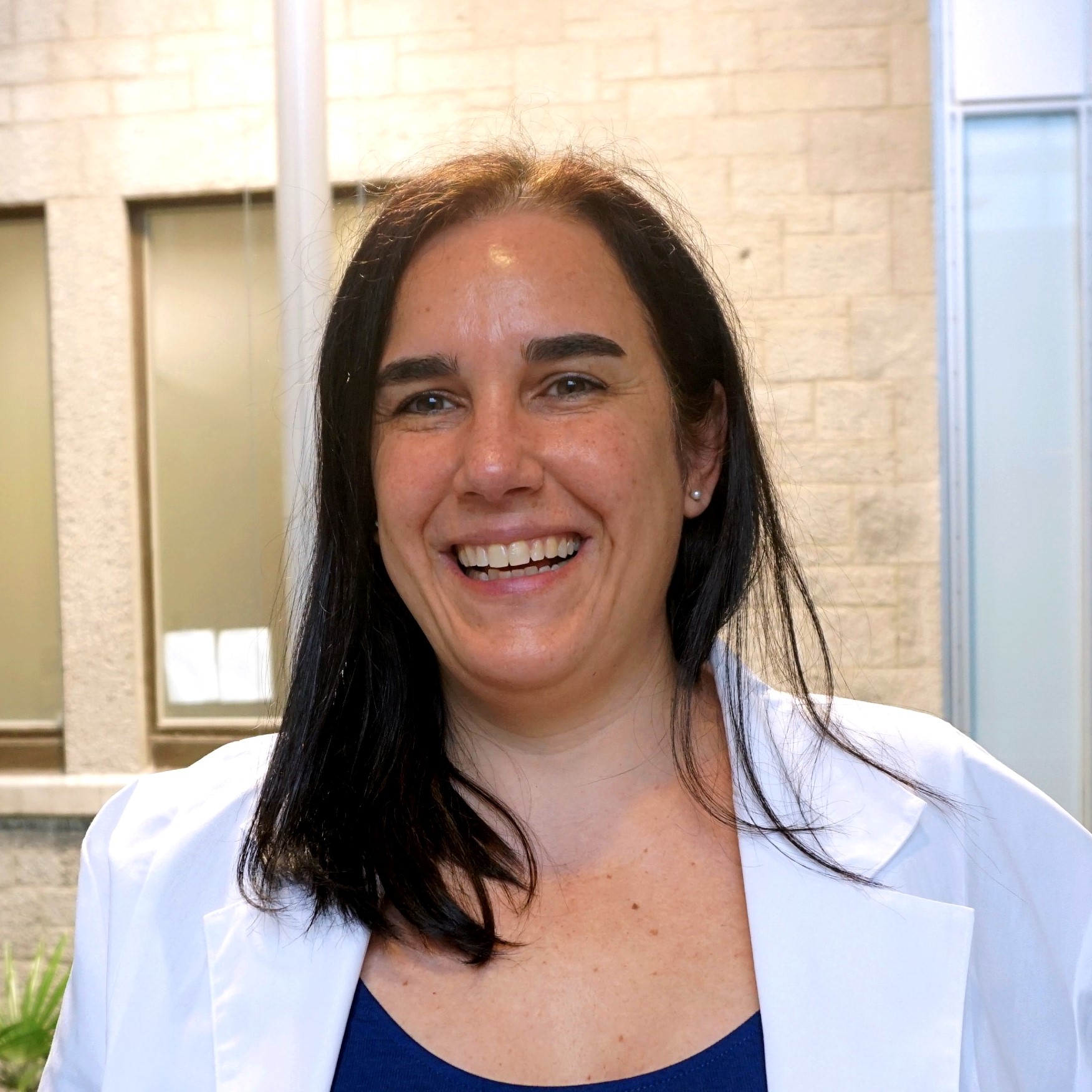CURRENT RECRUITING TRIALS
For more information, please contact nm.neurocru@mcgill.ca
ASTELLAS AT8450-02 (Pompe)
Pompe disease is a genetic condition which causes muscle weakness over time. People with Pompe disease have a faulty gene that makes an enzyme called acid alpha-glucosidase (or GAA). Without this enzyme, there is a build-up of glycogen in the cells of the body. The standard treatment for people with Pompe disease is to receive regular infusions of the GAA enzyme. However, people can build up antibodies against the GAA enzyme over time.
Gene therapy is used to treat conditions caused by a faulty gene. It works by replacing the faulty gene with a working gene, delivered into the cells using certain viruses as carriers (vectors). The genetic material of the original virus is replaced with the working gene, so only the working gene gets inside the cells. A common virus used as a carrier in gene therapy is the adeno-associated virus (or AAV). This is like an adenovirus, which causes the common cold.
The original type of AAV does not cause any harm to humans. However, people that have previously been infected with the original type of AAV may have built up antibodies against AAV. These antibodies may stop the AAV carrier with the working gene getting inside the cells.
In this study, older teenagers and adults with late-onset Pompe disease will take part. They will not have had gene therapy using AAV. There will be 2 groups – those who have never had enzyme replacement therapy, and those who have had enzyme replacement therapy for 6 months or more. No study treatment will be given during the study, but blood and urine samples will be taken for testing.
The main aims of the study are to check antibody levels against AAV8 (a type of AAV) in people with late-onset Pompe disease who had not received any treatment using AAV, to check antibody levels against the GAA enzyme in people previously treated with GAA as part of enzyme replacement therapy, to check levels of biomarkers for Pompe disease, and to check for medical problems.
SANOFI VITALIZE (CIDP)
The purpose of the study is to evaluate efficacy of riliprubart compared to IVIg in adult participants with CIDP who are receiving maintenance treatment with IVIg. The study duration will be for a maximum of 109 weeks including screening, treatment phases, and follow-up.
VERTEX GALILEO (Myotonic Dystrophy)
The purpose of the study is to evaluate the safety, tolerability, pharmacokinetics, and pharmacodynamics of VX-670 at different single and multiple doses in participants with DM1.
UKansas MOVE (FSHD)
Motor Outcomes to Validate Evaluations in Fascioscaperohumeral Dystrophy (MOVE FSHD)
The primary goal of this proposal is to collect motor and functional outcomes specific to FSHD over time. By collecting measures specific to FSHD, this will help ensure the best level of clinical care is being provided. Also, the hope is to speed up drug development by gaining a better understanding of how having FSHD impacts motor function and other health outcomes (i.e. breathing, wheelchair use, etc.) and how big a change in motor function would be clinically meaningful to those with FSHD.
Motor Outcomes to Validate Evaluations in FSHD (MOVE FSHD) will have approximately 450 FSHD participants followed for a minimum of 3 years. A subset of MOVE FSHD participants, approximately 200, will participate in the MOVE+ sub-study which includes whole body MRI and muscle biopsy.
For more information, please contac
The Team

Dr. Oliver Blanchard
Principal Investigator
__
For more information, please contac

Dr. Erin O’Ferrall
Principal Investigator
UPCOMING TRIALS
ARGENX ARGX-113 ADAPT OCULUS (Ocular Myasthenia Gravis)
The purpose of this study is to evaluate the efficacy and safety of efgartigimod PH20 SC given by a pre-filled syringe in adult patients with ocular myasthenia gravis. The study consists of a part A (approximately 7 weeks) and a part B (up to 2 years). In part A, half of the participants will receive efgartigimod PH20 SC and the other half will receive placebo. In part B, all participants will receive efgartigimod PH20 SC. The participants will be in the study for about up to 2 years and 12 weeks.
ARROWHEAD ARO-DM1 (Myotonic Dystrophy)
A Phase 1/2a Dose-Escalating Study to Evaluate the Safety, Tolerability, Pharmacokinetics, and Pharmacodynamics of ARO-DM1 in Subjects With Type 1 Myotonic Dystrophy Who Are 18 to 65 Years Old
This is a Phase 1/2a double-blinded, placebo-controlled, dose-escalating study to evaluate the safety, tolerability, pharmacokinetics (PK) and pharmacodynamics (PD) of single and multiple ascending doses of ARO-DM1 compared to placebo in male and female subjects with Type 1 Myotonic Dystrophy (DM1).
ARROWHEAD ARO-DUX4 (FSHD)
The purpose of this study is to evaluate the safety, tolerability, pharmacokinetics (PK) and pharmacodynamics (PD) of ARO-DUX4 in participants with facioscapulohumeral muscular dystrophy Type 1 (FSHD1). In Part 1 of the study, participants will receive one dose of ARO-DUX4 or placebo. In Part 2 of the study, participants will receive 4 doses of ARO-DUX4 or placebo. Participants who complete Part 1 will have the option to re-screen and re-randomize into Part 2. All participants will undergo pre- and post-dose MRI-guided muscle biopsies (a total of 2 biopsies). Participants who complete Part 1 and enroll in Part 2 will be required to undergo an additional screening biopsy. Participants completing Part 1 or Part 2 may have the option to continue to receive drug in an open-label extension study or may be eligible to participate in later-stage clinical studies.
PEPGEN FREEDOM 2 (Myotonic Dystrophy 1)
The primary purpose of the study is to evaluate the safety and tolerability of single intravenous (IV) doses of PGN-EDODM1 administered to participants with Myotonic Dystrophy Type 1 (DM1).
The study consists of 2 periods: A Screening Period (up to 30 days) and a Treatment and Observation Period (16 weeks).
EMD Serono MyCLAD (generalized Myasthenia Gravis)
The purpose of this clinical study is to determine the efficacy and safety of a new oral cladribine formulation in participants with Generalized Myasthenia Gravis (gMG) in comparison to placebo. It will also investigate the sustained efficacy, the need for retreatment, and the long-term safety of oral cladribine in gMG. An additional component is included to characterize the Pharmacokinetics (PK) of the new cladribine formulation in gMG participants. This study is divided into 3 periods: the double-blind placebo control (DBPC) pivotal period, and 2 extensions, the blinded extension (BE) and the retreatment (RT) period.
CHUGAI RAY902CT RAINBOW (Immune mediated necrotizing myopathy, dermatomyositis)
This Phase 1b basket trial will investigate the safety, tolerability, pharmacokinetics, pharmacodynamics, immunogenicity and preliminary efficacy of RAY121, a inhibitor of classical complement pathway, after multiple dose administration in patients with immunological diseases such as antiphospholipid syndrome (APS), bullous pemphigoid (BP), Behçet’s Syndrome (BS), dermatomyositis (DM), immune-mediated necrotizing myopathy (IMNM) and immune thrombocytopenia (ITP).

Dr. Rami Massie
Principal Investigator

Dr. Daria Trojan
Principal Investigator

Dr. Angela Genge
Principal Investigator

Dr. Bernard Brais
Principal Investigator
ACTIVE (NOT RECRUITING) TRIALS
ARGENX ARGX-113-2003 (generalized Myasthenia Gravis)
The purpose of this open-label study is to investigate the efficacy, safety, and tolerability of a continuous regimen of efgartigimod compared with a cyclic regimen in participants with Generalized Myasthenia Gravis (gMG).
Study details include:
The study duration will be up to 138 weeks (including screening and a safety follow-up of up to 9 weeks)
- Part A (regimen comparison period) – 21 weeks
- Part B (extension period) – up to 105 weeks
The visit frequency, including virtual visits, will be weekly through Week 21 and every 5 weeks for the remainder of the study.
ARGENX ARGX-117-2202 (Multifocal Motor Neuropathy)
A Multicenter Prospective Longitudinal Study of Clinical Outcomes, Disease Course, Health-Related Quality of Life, and Health Care Resource Utilization in Adult Patients With Multifocal Motor Neuropathy
This trial is an extension of the antecedent trial ARGX-117-2002. It is a multicenter trial that has been designed to evaluate the long-term safety and tolerability, efficacy, immunogenicity, Pharmacokinetics (PK), and Pharmacodynamics (PD) of ARGX-117 Intravenously (IV) in adults with Multifocal Motor Neuropathy (MMN). The trial will include a double-blinded rollover treatment period (DTP), an open-label treatment period (OTP), and a safety follow-up period.
IMMUNOVANT IMVT-1401-3101 (generalized Myasthenia Gravis)
The purpose of this study is to learn how well batoclimab works and how safe it is, when compared with placebo (an inactive material that looks like batoclimab but does not have any active drug).
The placebo used in this study looks exactly like batoclimab but it does not contain any active medication. Placebos are sometimes called sugar pills, dummy treatments, or shams. We are using a placebo to compare with batoclimab, and to ensure that the changes you report in your health, good or bad, are not only due to chance. In this information and consent form, the use of “study drug” refers either to batoclimab or the placebo.
For this study, 240 male and female participants will be recruited at approximately 110 centers across North America, Asia, Europe, Central America, and South America. The participants will be aged 18 and older.
RAISE (gMG)
From clinicaltrials.gov:
The RAISE study is a multicenter, randomized, double-blind, placebo controlled study to confirm the efficacy, safety, and tolerability of zilucoplan in subjects with generalized Myasthenia Gravis. Subjects will be randomized in a 1:1 ratio to receive daily SC doses of 0.3 mg/kg zilucoplan or placebo for 12 weeks.

Maria Gobbo
Team Lead, Clinical Research Coord

Julia Chiappini
Clinical Research Coordinator

Sabrina Yusuf
Clinical Research Coordinator

Marie-Lise Béland
Clinical Research Coordinator

Maryam Leclerc
Clinical Research Coordinator
